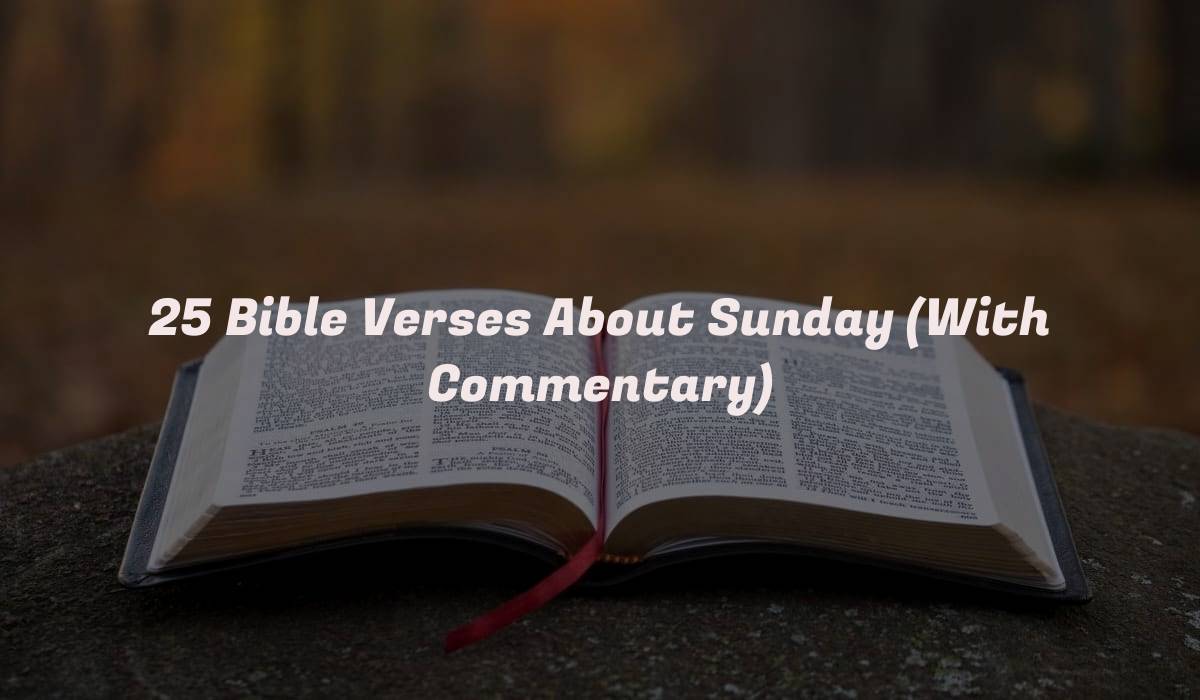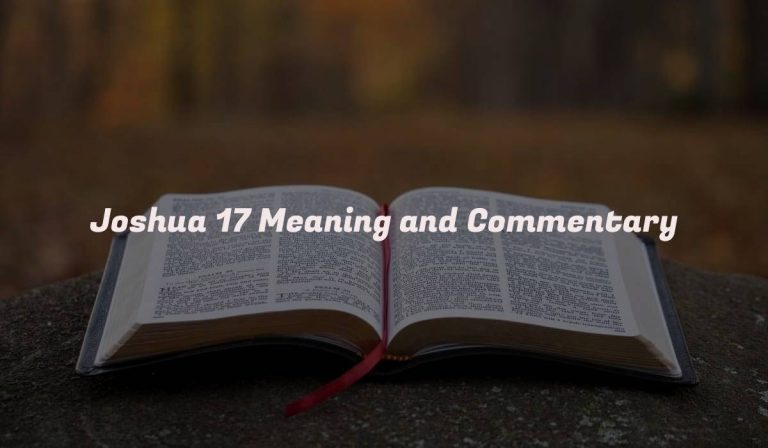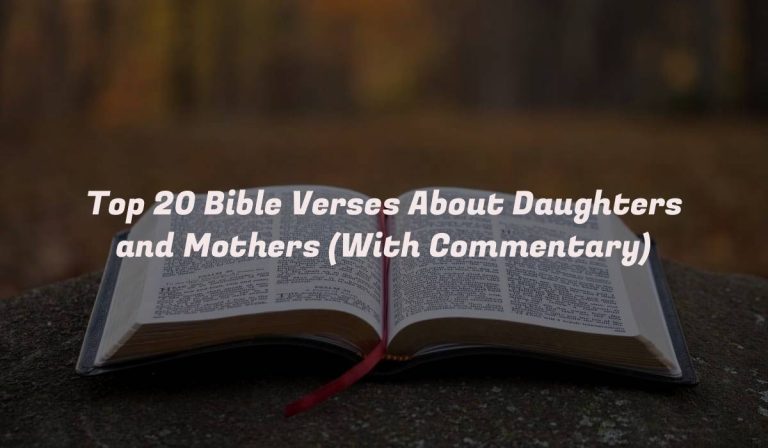25 Bible Verses About Sunday (With Commentary)

Sunday—the day of rest, worship, and reflection. As a sacred day in many religious traditions, Sunday holds a special significance. In this article, we delve into the Scriptures to uncover Bible verses that illuminate the importance of Sunday and provide guidance on how to make the most of this dedicated day, nurturing our spiritual well-being and fostering a deeper connection with God.
Bible Verses About Sunday
Acts 20:7
“On the first day of the week, when we were gathered together to break bread, Paul talked with them.”
This verse highlights the significance of the first day of the week, which is Sunday. The early Christians gathered on this day to commemorate the Lord’s Supper and engage in fellowship. It signifies a special time for believers to come together, worship, receive teaching, and partake in communion.
1 Corinthians 16:2
“On the first day of every week, each of you is to put something aside and store it up.”
In this verse, Paul instructs the Corinthians to set aside their contributions on the first day of the week. It emphasizes the practice of regular giving and offering as part of the believers’ worship on Sundays. This act not only supports the work of the church but also reflects the heart of generosity and stewardship.
John 20:1
“Now on the first day of the week Mary Magdalene came to the tomb early.”
This verse refers to the resurrection of Jesus Christ, which took place on the first day of the week, commonly understood as Sunday. It marks a pivotal event in Christianity, signifying victory over sin and death. Sunday, therefore, holds deep significance as a day of rejoicing and celebration for believers.
Mark 16:9
“Now when he rose early on the first day of the week, he appeared first to Mary Magdalene.”
The resurrection of Jesus Christ, as mentioned in this verse, occurred on the first day of the week. This event not only signifies Christ’s victory but also establishes Sunday as a day of remembrance and renewal for believers. It serves as a reminder of the hope and new life found in Jesus.
Revelation 1:10
“I was in the Spirit on the Lord’s day.”
The apostle John, while exiled on the island of Patmos, mentions being in the Spirit on the “Lord’s day.” Many interpret this to refer to Sunday, the first day of the week when believers gather to worship the Lord. It highlights the spiritual significance and sanctity of Sunday as a day dedicated to honoring and communing with God.
Psalm 118:24
“This is the day that the Lord has made; let us rejoice and be glad in it.”
This verse encapsulates the joy and gratitude expressed on a particular day—the day the Lord has made. While it doesn’t explicitly mention Sunday, it reminds believers to embrace each day, including Sundays, with a heart of rejoicing and gladness, recognizing God’s sovereignty and goodness.
Hebrews 10:24-25
“And let us consider how to stir up one another to love and good works, not neglecting to meet together, as is the habit of some, but encouraging one another, and all the more as you see the Day drawing near.”
These verses emphasize the importance of gathering as a community of believers, not neglecting to meet together. Sunday serves as a special time for mutual encouragement, edification, and accountability. It provides an opportunity for believers to support and spur one another on toward love and good deeds, especially as they anticipate the return of Christ.
Acts 2:46
“And day by day, attending the temple together and breaking bread in their homes, they received their food with glad and generous hearts.”
This verse illustrates the early believers’ devotion to meeting together regularly. They gathered both in the temple and in their homes to worship, share meals, and cultivate a spirit of joy and generosity. Sundays, in particular, were significant for communal worship and fellowship.
Matthew 28:1
“Now after the Sabbath, toward the dawn of the first day of the week, Mary Magdalene and the other Mary went to see the tomb.”
This verse refers to the visit of Mary Magdalene and the other Mary to the tomb of Jesus after the Sabbath. It sets the stage for the resurrection account, emphasizing the significance of the first day of the week, which is Sunday. Believers often commemorate this event and its implications for their faith on Sundays.
Colossians 2:16-17
“Therefore let no one pass judgment on you in questions of food and drink, or with regard to a festival or a new moon or a Sabbath. These are a shadow of the things to come, but the substance belongs to Christ.”
These verses highlight that the observance of particular days, including the Sabbath, should not be a basis for passing judgment or creating divisions among believers. While recognizing the value of Sabbath rest, they also emphasize that the substance of our faith is found in Christ. Sunday, as the Lord’s day, holds significance as a time dedicated to honoring our relationship with Him.
Luke 24:1
“But on the first day of the week, at early dawn, they went to the tomb, taking the spices they had prepared.”
This verse speaks of the women who went to the tomb of Jesus on the first day of the week, which is Sunday. Their actions initiated the discovery of the empty tomb and the realization of Christ’s resurrection. Sunday thus became a pivotal day in the history of Christianity, representing the triumph of life over death.
Acts 20:6-7
“We sailed away from Philippi after the days of Unleavened Bread, and in five days we came to them at Troas, where we stayed for seven days. On the first day of the week, when we were gathered together to break bread, Paul talked with them.”
This passage provides a glimpse into the early Christian practice of gathering on the first day of the week, which is Sunday, for worship, teaching, and the breaking of bread. It reflects the importance of communal worship and the apostolic teaching that took place on Sundays.
Mark 16:2
“And very early on the first day of the week, when the sun had risen, they went to the tomb.”
This verse portrays the visit of the women to the tomb of Jesus on the first day of the week, Sunday. It highlights their devotion and eagerness to honor Jesus even after His crucifixion. Sunday, therefore, holds significance as a day of renewed hope and faith in the resurrection.
Acts 2:1
“When the day of Pentecost arrived, they were all together in one place.”
The day of Pentecost, when the Holy Spirit was poured out upon the believers, was a significant event in early Christianity. It occurred on a Sunday, fifty days after Jesus’ resurrection, symbolizing the birth of the Church. Sunday, in light of this event, became a day of celebrating the empowering presence of the Holy Spirit.
John 20:19
“On the evening of that day, the first day of the week, the doors being locked where the disciples were for fear of the Jews, Jesus came and stood among them.”
This verse recounts an appearance of Jesus to His disciples on the first day of the week, Sunday. Despite their fear and uncertainty, Jesus brought them peace and reassurance. It signifies that Sundays can be times of encountering the risen Lord and receiving His comfort and guidance in the midst of challenges.
Acts 2:42
“And they devoted themselves to the apostles’ teaching and the fellowship, to the breaking of bread and the prayers.”
This verse highlights the practices of the early believers, which included devoting themselves to the apostles’ teaching, fellowship, breaking of bread, and prayers. Sunday gatherings provided a dedicated time for engaging in these essential aspects of Christian faith, fostering spiritual growth and unity among believers.
1 Corinthians 16:1-2
“Now concerning the collection for the saints: as I directed the churches of Galatia, so you also are to do. On the first day of every week, each of you is to put something aside and store it up, as he may prosper, so that there will be no collecting when I come.”
Paul instructs the Corinthians to set aside contributions on the first day of the week, emphasizing the practice of regular giving for the support of fellow believers. Sundays provide an opportunity to reflect on God’s provision and exercise generosity, contributing to the welfare of the Church and those in need.
Acts 20:7
“On the first day of the week, when we were gathered together to break bread, Paul talked with them, intending to depart on the next day, and he prolonged his speech until midnight.”
This verse portrays an evening gathering of believers on Sunday, during which Paul engaged in teaching and fellowship. The extended duration of Paul’s speech demonstrates the eagerness of the believers to receive instruction and commune with one another on this special day. Sundays offer valuable opportunities for deepening our understanding of God’s Word.
Psalm 118:22-24
“The stone that the builders rejected has become the cornerstone. This is the Lord’s doing; it is marvelous in our eyes. This is the day that the Lord has made; let us rejoice and be glad in it.”
These verses speak of the significance of a specific day that the Lord has made, urging believers to rejoice and be glad. Although it doesn’t explicitly mention Sunday, it encourages us to embrace each day as a gift from God, including Sundays, with hearts filled with joy and gratitude for His marvelous works.
Romans 14:5-6
“One person esteems one day as better than another, while another esteems all days alike. Each one should be fully convinced in his own mind. The one who observes the day, observes it in honor of the Lord.”
These verses remind believers that the esteem placed on particular days can vary among individuals. While Sunday holds significance for many as the Lord’s day, there is freedom to honor and worship God on other days as well. The focus is on honoring the Lord with sincere hearts rather than engaging in disputes over days of observance.
Matthew 12:8
“For the Son of Man is lord of the Sabbath.”
Jesus makes this statement to clarify His authority over the Sabbath. Although it does not explicitly refer to Sunday, it signifies that Jesus, as the Son of Man and the Lord of all, holds authority over all days, including the Sabbath. This highlights the significance of Jesus’ role and His lordship over every aspect of our lives, including our worship on Sundays.
Mark 2:27-28
“And he said to them, ‘The Sabbath was made for man, not man for the Sabbath. So the Son of Man is lord even of the Sabbath.’”
In these verses, Jesus teaches that the Sabbath, established as a day of rest and worship, was intended for the benefit and well-being of humanity. As the Son of Man and the Lord of all, Jesus has authority even over the Sabbath. While not explicitly mentioning Sunday, these verses emphasize the importance of the day of rest and worship in the life of believers.
Acts 1:12
“Then they returned to Jerusalem from the mount called Olivet, which is near Jerusalem, a Sabbath day’s journey away.”
This verse provides context for the disciples’ return to Jerusalem after witnessing Jesus’ ascension from the Mount of Olives. Although it mentions the Sabbath, it sets the stage for the subsequent events that would unfold, including the outpouring of the Holy Spirit on the day of Pentecost, which fell on a Sunday.
Acts 16:13
“And on the Sabbath day we went outside the gate to the riverside, where we supposed there was a place of prayer.”
In this verse, Paul and his companions visit a riverside on the Sabbath day, seeking a place of prayer. While it doesn’t specifically mention Sunday, it highlights the practice of seeking God’s presence and engaging in spiritual activities on dedicated days, such as Sundays, for worship and fellowship.
Isaiah 58:13-14
“If you turn back your foot from the Sabbath, from doing your pleasure on my holy day, and call the Sabbath a delight and the holy day of the Lord honorable; if you honor it, not going your own ways, or seeking your own pleasure, or talking idly; then you shall take delight in the Lord.”
These verses emphasize the importance of honoring the Sabbath and dedicating it as a day of delight in the Lord. While not explicitly referring to Sunday, it serves as a reminder that setting aside dedicated times for worship, rest, and focusing on God cultivates a deeper relationship with Him.
Revelation 1:10
“I was in the Spirit on the Lord’s day.”
John mentions being “in the Spirit” on the “Lord’s day.” Although it does not explicitly state that the Lord’s day is Sunday, it is commonly understood as such. John’s statement highlights the significance of this day as a time of spiritual communion and encounter with God through the Holy Spirit.
These Bible verses reflect the significance of Sunday as a day of gathering, worship, rest, and encountering God’s presence. Each verse holds its unique message and relevance to the concept of Sunday in the context of Christian faith and practice.






